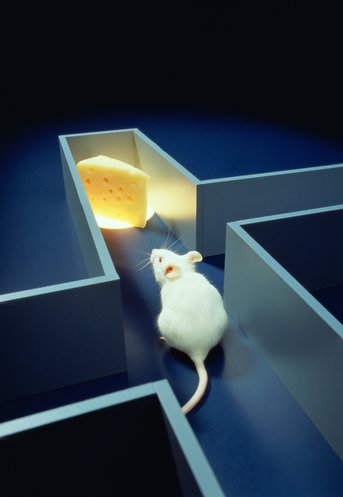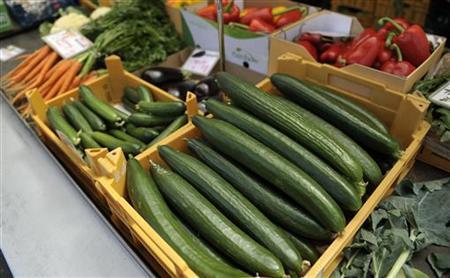More women have died in Germany from an E. coli O104 outbreak linked to cucumbers grown in Spain, bringing the death toll to 10. Of the 1,000 or so sick, 276 have hemolytic uremic syndrome (HUS).
Hospitals in the city of Hamburg, where more than 400 people are believed to have been infected, were said to be overwhelmed and sending patients to clinics elsewhere in the country.
Austria’s food safety agency ordered a recall of organically grown cucumbers, tomatoes and aubergines supplied by a Spanish producer which is thought to be the  source of the outbreak. It said 33 Austrian stores were affected.
source of the outbreak. It said 33 Austrian stores were affected.
According to Denmark’s National Serum Institute, there are nine confirmed cases, with at least another eight people suspected of having the intestinal infection, also known as VTEC, in Denmark.
Sweden has reported 25 E. coli cases, of whom 10 developed HUS, according to the European Commission, while Britain counted three cases (two HUS).
Officials in the Czech Republic said the cucumbers may have been exported there, as well as to Austria, Hungary and Luxembourg.
"As long as the experts in Germany and Spain have not been able to name the source of the agent without any doubt, the general warning for vegetables still holds," German Agriculture and Consumer Protection Minister Ilse Aigner said on Sunday in a report in the Bild am Sonntag newspaper.
The European Commission says experts are now probing two agricultural sites in southern Spain, in Almeria and Malaga, suspected of exporting products, most likely cucumbers, tainted with E. coli.

.jpg) following the advice of the Robert Koch Institute and not eating raw cucumbers, lettuce or tomatoes.
following the advice of the Robert Koch Institute and not eating raw cucumbers, lettuce or tomatoes..jpg) cucumber deliveries while stressing there is no proof that the EHEC entered Germany through Spanish cucumbers.
cucumber deliveries while stressing there is no proof that the EHEC entered Germany through Spanish cucumbers..jpg) 80% of the confirmed cases were in females and 45% were in people aged between 15-24 years (range 7 to 53).
80% of the confirmed cases were in females and 45% were in people aged between 15-24 years (range 7 to 53). Cornelia Pruefer-Storcks.
Cornelia Pruefer-Storcks. swimming pool.
swimming pool..jpg) the time."
the time."(1).jpg) Mr Liddell, who also has a heart condition, was taken to the Royal Alexandra Hospital in Paisley after visiting his doctor when he returned to Scotland.
Mr Liddell, who also has a heart condition, was taken to the Royal Alexandra Hospital in Paisley after visiting his doctor when he returned to Scotland. In total, 14 holidaymakers contracted E.coli O157 after stays in Benidorm during November.
In total, 14 holidaymakers contracted E.coli O157 after stays in Benidorm during November..jpg) The Food Standards Agency (FSA) said
The Food Standards Agency (FSA) said But I wouldn’t wish food poisoning on anyone.
But I wouldn’t wish food poisoning on anyone.